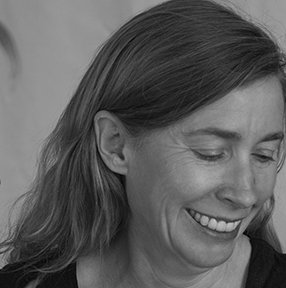Ode to Goby
Here, floating with the water
I escape. I float. I immerse in the richness
of the forest; fade into the dark greens
of the ferns and reeds of the shore,
the light greens of the new leaves on the trees,
the water rushing, and oh the bird calls too.
Came to sedate, cleanse, escape.
Came to clear out my dreams
filled with bears that each night enter
my room, tearing it apart
so as to let me know there aren’t enough
fish this year and likely the next too.
Came for water so clear
that I could wash, that I could see.
Came to see a goby,
a blue, a purple, a turquoise
too when seen from the side,
then a clear that is as a pink when it turns.
Even as it is getting dark so fast
that there is almost nothing left to see
still, we together swim on, into some world
not yet imagined, not yet understood.
Oh goby, I am sorry we have made things
so impossible for you, for all of us.
Sorry that we have done so much that
you are few; sorry to be so lost, imageless,
confused; sorry that I do not know how to be
other than Grendel, swamp-like, dwelling in fen
and moorland, up to his knees in the water
wandering the outskirts of town, angry,
unforgiving of those who still find happiness
amidst loss. Goby, even the very things
that would cure us we put at risk:
the tall tapering racemes of white midsummer
flowers on wiry black-purple stems
that is the black cohosh; the blood red sap
of the bloodroot and its small white petals that
open up in sunlight; the hairy deep purple
stems of the goldenseal that support two hand-shaped leaves.
This world that once was so much, now less.
This world that was once a luminous archive
of things evolved and adapted in slow moving
specificity. This world that Césaire wrote
when there was the possibility
that it might turn some other way than the nation,
a world not of enclosure but of predatory
celebration, liberation, a world of the sparrowhawk,
the cynocephalus, the dolphins, and the wolves
who feed in the untamed openings.
Fled is that music, that world, that rhetorical question
and yet we continue on, angry, unforgiving, unsure.
Copyright © 2023 by Juliana Spahr. Originally published in Poem-a-Day on December 11, 2023, by the Academy of American Poets.
“I went to a river and I saw a goby. I was told it was endangered, that it was one of a hundred or two hundred left. It was a small goby, about a quarter inch at most. I felt weird looking at it, tromping through its fragile life. In the last few years, I’ve been teaching a workshop on the apostrophe. I chose the apostrophe—that moment when the poem addresses something not sentient, often by saying something like ‘oh, thing not sentient’—somewhat arbitrarily. Somewhat because the literary critic Jonathan Culler calls it an embarrassing form. Somewhat because of the greatness of the literary critic Barbara Johnson’s essay ‘Apostrophe, Animation, and Abortion.” Somewhat because of the scholar Anahid Nersessian’s reading of [John] Keats’s ‘Ode to a Nightingale,’ also great. I was reading Beowulf, too. I am always thinking about [Aimé] Césaire’s Notebook of a Return to the Native Land. I sometimes say, as if I have actually counted, but I have not, that most of poetry is about love; and then what is not about love is about nature; and then what is not about love or nature is about the author. So I was thinking about that too.”
—Juliana Spahr

